BBC finds police BMWs at risk of exploding still on the roads
- Published

Husband and wife Kathryn and Nick Dumphreys both worked for Cumbria Police
A "catastrophic" engine failure saw a police BMW catch fire and spin off the road, killing its driver. The fault had been known about for years. The officer's widow now wants answers. Why did no-one warn her husband of the risks? And why are these cars still on the road?
On a Sunday afternoon in January 2020, roads policing officer PC Nick Dumphreys was responding to an emergency call on the M6.
Unknown to him, the engine in his BMW 330d was liable to shatter and burst into flames.
As he neared 130mph, two parts of the engine failed. A third part fractured, puncturing a fourth. Oil spilled on to the wheels and road, igniting and sending the vehicle spinning. The car veered off the motorway, overturned and caught fire. PC Dumphreys was killed.
His force, Cumbria Constabulary, had known for years there were problems with the model of engine in his car - the N57. The risk was so real, all UK forces had been sent guidance on how to use and maintain vehicles that had it.
Now the BBC can reveal 32 of England's 39 police forces are still using cars with the same engine. Only four forces would say how many though, with them admitting 63 vehicles were still in service.
Given most forces would not say how many they had, the true number on the road is likely to be much higher.
Another four forces - one being Cumbria - said they had stopped using them. The remaining three either would not say or have not responded to Freedom of Information (FOI) requests.
PC Dumphreys' wife, Kathryn Dumphreys, herself a Cumbria Police officer for nearly 20 years, says BMW should "without a doubt" have recalled the cars when the issue first became apparent.

Mrs Dumphreys has criticised police leaders for not withdrawing the models from service
The N57 was used in civilian 3 series, 4 series, 5 series, 6 series, 7 series, X3, X4, X5 and the X6. Tens of thousands of them were sold to the public but BMW said the fault had only ever been seen in UK police cars due to the way they are driven.
The inquest into PC Dumphreys' death heard the N57, a diesel engine produced between 2008 and 2019, had been failing in UK police cars five to seven times a month since 2014, and the 47-year-old's car was not the first to burst into flames.
"I just can't understand how they didn't withdraw them from policing, apart from to do with cost or public image," Mrs Dumphreys says.
"They should have been withdrawn years ago.
"It's not like it's come as a surprise. This has been happening for a very long time."
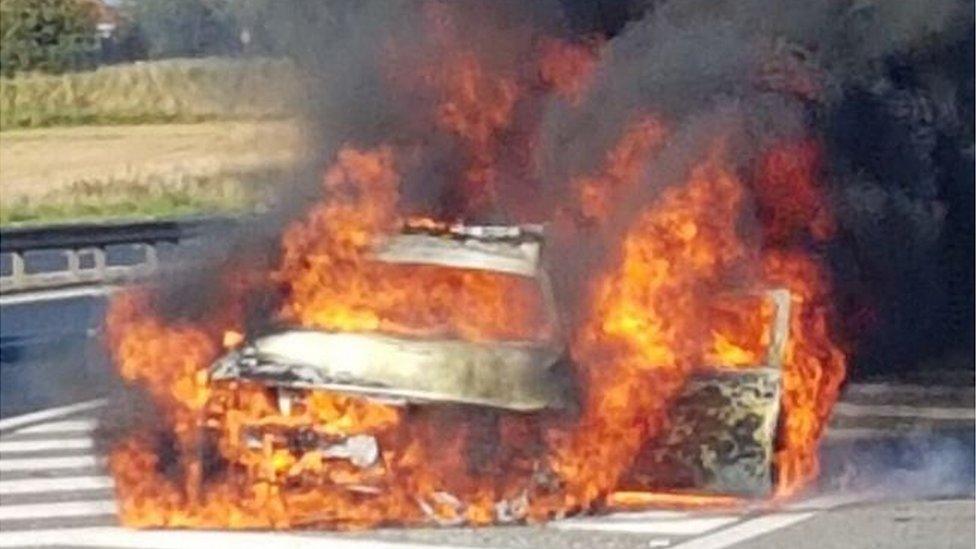
A North Yorkshire police car "suffered a catastrophic engine failure" in August 2017
That the N57 engine had flaws first became apparent nine years ago. Then, in January 2016, came the first "thermal incident" - a police car fire caused by the same crankshaft bearing issue that later affected PC Dumphreys' car.
Tests showed engine oil was being degraded by high levels of idling - sitting, parked, with the engine running. This reduced the oil's lubrication, leading to wear on the engine's crankshaft bearings.
In the August BMW passed this information to two people: the chairman and one member who form the technical committee of the voluntary National Association of Police Fleet Managers (NAPFM). Three months later BMW issued guidance that forces use a more viscous oil and change it more frequently, at 10,000-mile intervals.
This information was disseminated to forces via NAPFM - an "informal approach" Cumbria assistant coroner Robert Cohen concluded was not "sufficiently robust".
'Extraordinarily high'
BMW said it also wrote directly to individual police forces, including Cumbria. "This was an ongoing dialogue over a period of years, as more became known about this unique challenge," a spokesperson said.
Over the next two years the company came to the conclusion the "particular way" UK forces used the vehicles was the problem. Long hours, high mileage and a lot of time sitting with the engine idling, followed by sudden, sharp acceleration and high speed put "extra strain on some components", it said.
Still using NAPFM as a conduit, the company requested service histories and introduced new service timings based on in-car software rather than at regular intervals.
But some forces resisted this Condition Based Servicing (CBS) system, which might require a service after just 5,000 miles, arguing it was too expensive and reduced their cars' availability. It also relied on officers alerting their fleet manager when the warning light came on. Many forces pressed for a return to 10,000-mile intervals.
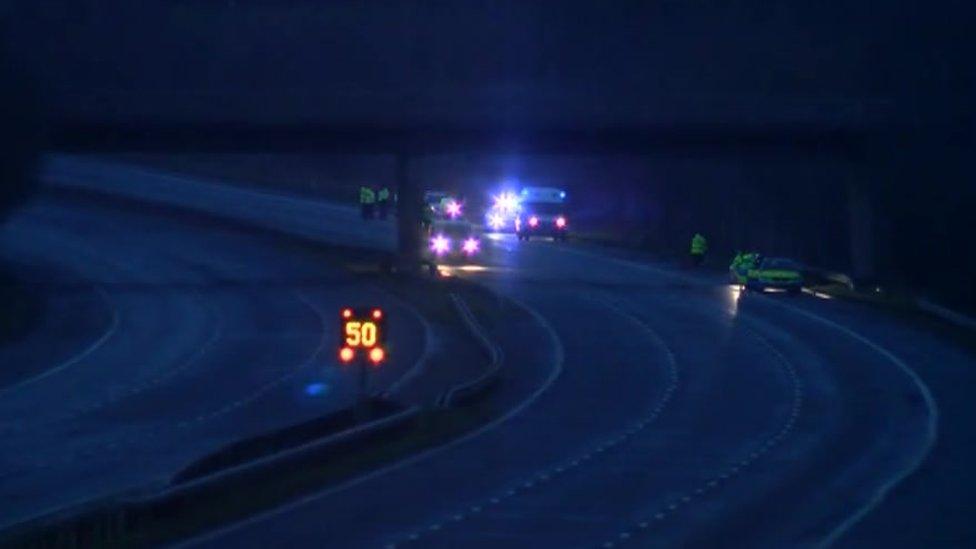
A section of the M6 motorway was closed after PC Dumphreys' crash
During this time BMW also signalled the need to restrict run lock, whereby a car could be locked and left with the engine still running. Cumbria Police's fleet manager at the time, James Poole, sent an internal email setting service intervals at 9,500 miles, but did not tell drivers to reduce idling or run lock, believing, wrongly, that the CBS system would monitor it.
Police cars were idling for 50% of the time, compared with 30% in civilian cars. Forensic engineer Dr Jan Graham called the resulting failure rate of 15% "extraordinarily high". Giving evidence to the inquest, he also said the engine in PC Dumphreys' car was, at the time of the crash, "not fit and safe for high performance use by the police".
However, BMW's N57 Customer Support Programme (CSP), introduced in 2018 and based on car service history and data, did not place PC Dumphreys' car in either of its high risk categories, which would have seen its crankshaft bearing and possibly also its timing chain replaced.
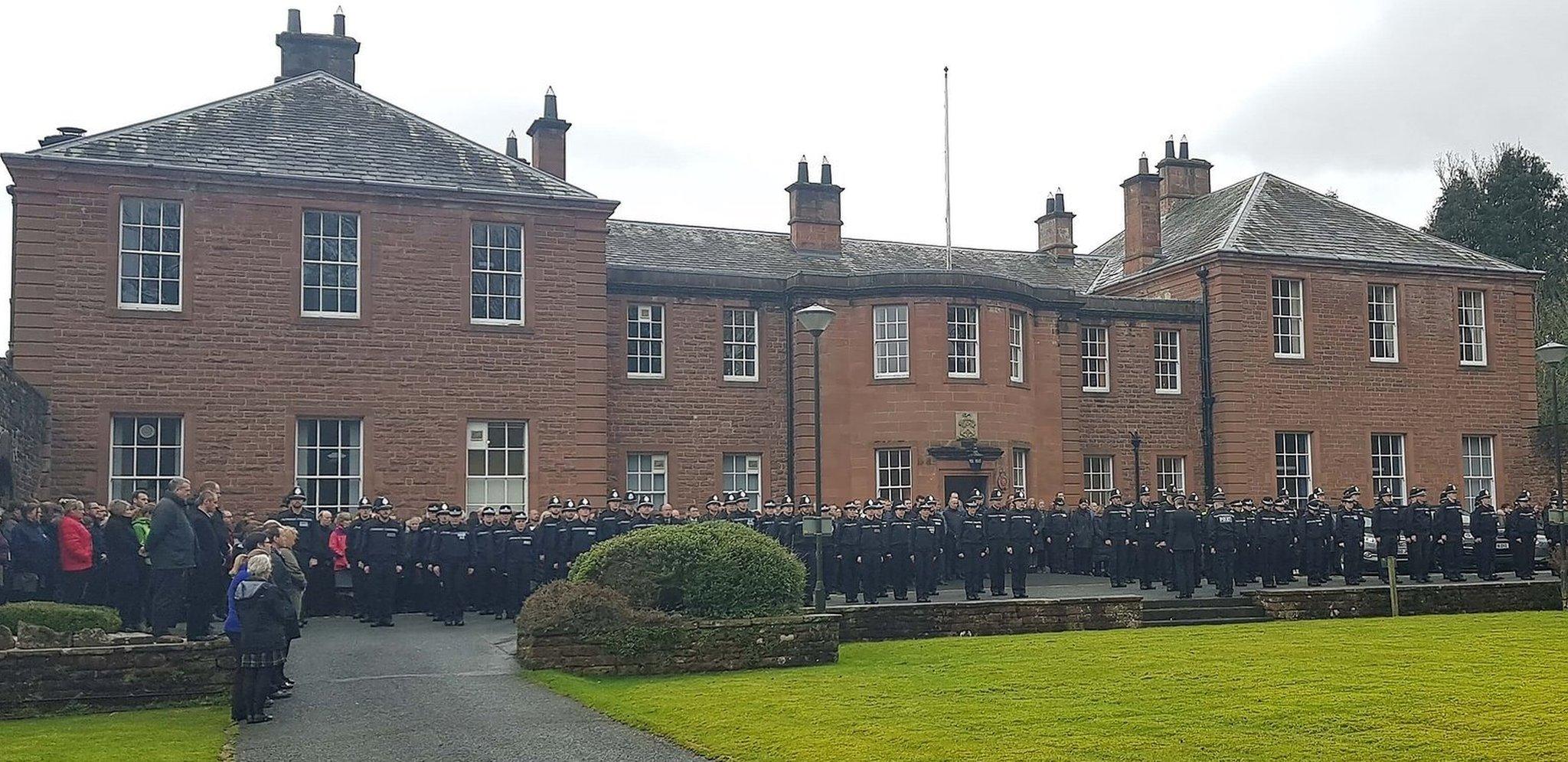
Cumbria Police officers paid tribute to PC Dumphreys after he died
Mr Poole told the inquest there was no written policy regarding checking the state of the cars. He would simply have conversations with technicians, based on data pulled from the system such as mileage or cost to maintain. A technician giving evidence at the inquest appeared unaware of this process and said he also did not know about the idling limitations.
Another FOI request by the BBC has returned - late and after an intervention by the Information Commissioner's Office - copies of force fleet strategy documents from 2019 onwards. Neither the document published before PC Dumphreys died, nor those drawn up since, mention any additional measures for cars with the N57 engine.
Cumbria Police said the force had taken "all reasonable and proportionate steps given the information available at the time".
While all this was going on, police cars were going up in flames at a rate Mr Cohen described as "startlingly high".
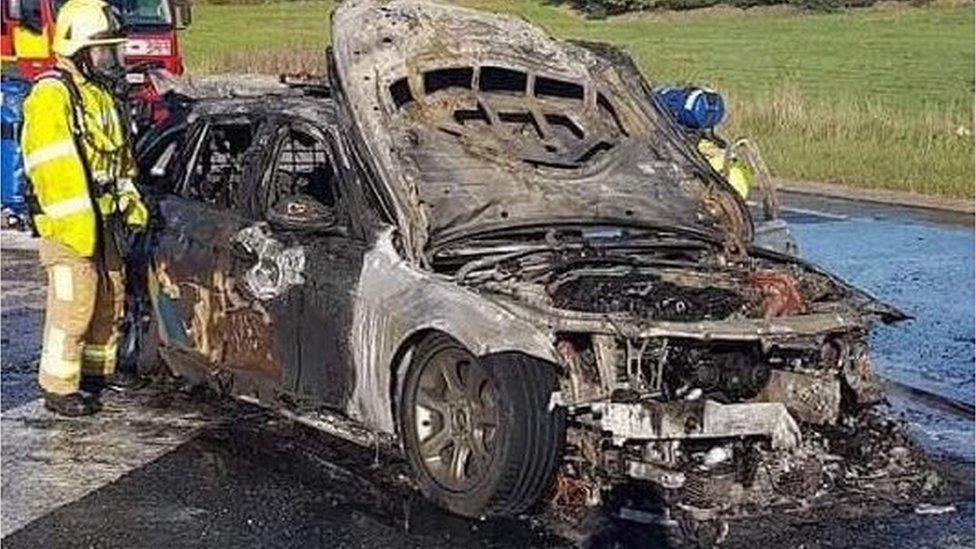
The North Yorkshire police car was completely burnt out
A history of fires
A North Yorkshire police car was left a burnt-out wreck after a "catastrophic engine failure" while responding to a 999 call.
Two Kent Police officers had a lucky escape, external when their car ended up "burnt beyond recognition".
The same thing happened to a Metropolitan Police car, external, also on a 999 call.
A BBC camera crew captured the moment a Devon and Cornwall police car, external, already on fire, exploded.
An investigation is launched after a Lancashire police car, external ignites on the M6.
All these fires happened after BMW had told NAPFM about the N57 engine's vulnerability.
They carried on after PC Dumphreys' death - both Wiltshire Police, external and Norfolk Police put fires in 2021 down to engine failure and malfunction.
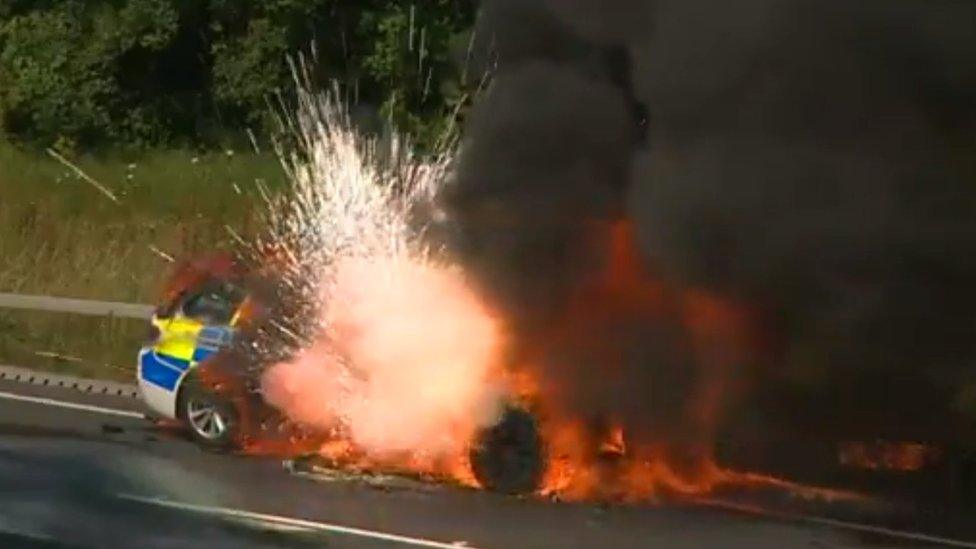
A Devon and Cornwall police car caught fire and exploded in July 2017
None of these, or other fires, were mentioned by Lancashire Police in the report it submitted to PC Dumphreys' inquest in September 2022 after being tasked by Cumbria Police with investigating what happened. It did not even consider the car fire within its own force, external in 2019, seven months before PC Dumphreys' crash.
Asked why, the force said "anything other than that collision" was not part of its remit.
Not considering the fires and engine failures as one, related, issue is where Mrs Dumphreys believes the forces, NAPFM and the NPCC went wrong. The lack of a connected approach was also raised at PC Dumphreys' inquest by Mr Cohen.
He criticised "ad hoc" arrangements for disposing cars and the fact there were no national standards for police garages and mechanics. The inquest heard the Cumbria force IT firewall blocked access to BMW maintenance programmes, so technicians used third-party software to understand fault codes.
In response to a "prevention of future deaths report, external" issued by Mr Cohen in January, the NPCC police driving lead, Deputy Chief Constable Terry Woods, promised a new NPCC-led fleet structure, external to disseminate information and said national standards were being drawn up.
Cumbria's chief constable said he supported the introduction of wider regulations and would implement them "where relevant and applicable" to the force's fleet.
Mrs Dumphreys argues the NPCC is allowing the use of cars with an engine that is "not fit for UK policing purposes". Even with restrictions ,"catastrophic engine failures" continued, she says. She believes nobody wants the cost and bad publicity of replacing them all.
"Cost is still being prioritised over safety, which is the root cause of all of this," she says.
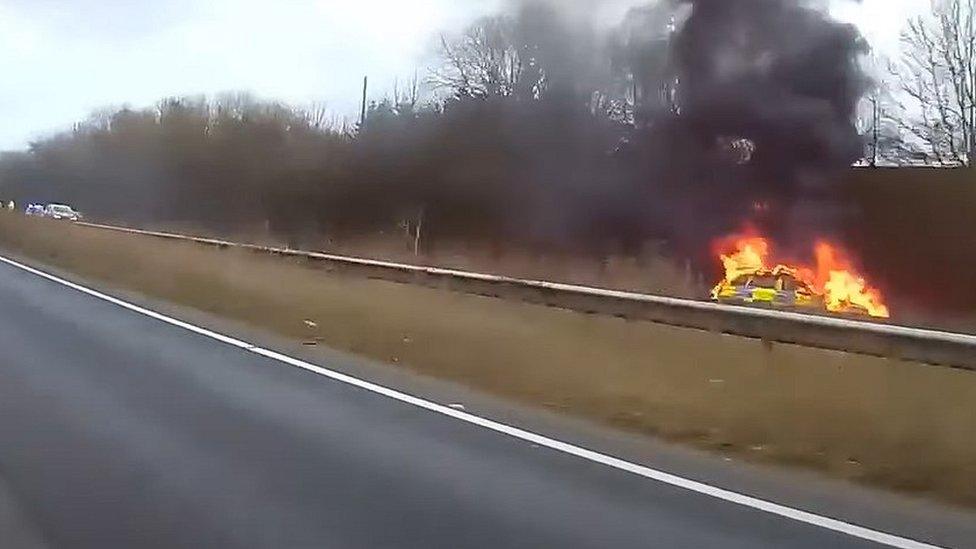
A Norfolk Police car on fire on A11 Wymondham, Norfolk in 2021
The NPCC said BMW had "confirmed in writing" that, if a vehicle "met all the requirements" it would be "deemed as safe for operational use".
In January 2022 - two years after PC Dumphreys was killed - BMW advised forces to tell officers to avoid driving at speed.
"Which is an absolute joke," says Mrs Dumphreys.
"If you can't drive them as you're supposed to be driving them as a police officer, get them off the road.
"They're not safe for the cops, and they're not safe for the public."
But most of England's police forces have not taken them off the road.
'Falls between the cracks'
In their FOI responses, only four forces - Cumbria, Hertfordshire, Leicester and North Yorkshire - said they had no N57s.
But the rules on usage and maintenance procedures vary considerably across the country, despite all forces receiving the same guidance.
Driving restrictions include a ban on exceeding the speed limit and on "unnecessary" or "excessive" idling, although it is not clear how necessity is determined. Not all forces require both.
Lancashire Police said it imposed no restrictions at all.
Three forces, responding jointly, sent two contradictory replies to the BBC. At first, Cambridgeshire, Bedfordshire and Hertfordshire said they had no records of which cars had the N57 engine.
When it was pointed out this meant they could not be following any guidance regarding their use, they sent a new response saying Cambridgeshire and Bedfordshire, but not Hertfordshire, did have N57 vehicles and were "following the national guidance".
Despite repeated requests, they have not said what this entails.

Nick Dumphreys was described by his wife as a "brilliant human"
BMW insists it "acted responsibly in responding to this unique technical issue". It had never seen the fault occur in civilian cars, or in police vehicles outside the UK, it said.
The company announced in January it was closing its division selling to UK forces but stressed this was a commercial decision. It said production of the N57 engine ended "several years ago" and vehicles supplied to police in recent years had been fitted with different engines.
Both the Independent Office for Police Conduct and the Health and Safety Executive said PC Dumphreys' case was outside their remit. The Driver and Vehicle Standards Agency, which is responsible for enforcing vehicle regulations, said it was "aware of incidents involving police BMWs fitted with N57 engines" but had not "found cause to recall" them.
"I refuse to accept that Nick's case just simply falls between the cracks of various agencies and legislation, solely because it involved a police car," Mrs Dumphreys says.
"Any other organisation or company would be investigated and are subject to the requirements of the law, so what makes the police any different?"
Speaking after the inquest, Cumbria Police Federation chairman Paul Williams said what happened to PC Dumphreys "cannot be allowed to happen again".
"It's by luck alone that we haven't lost any more lives," he said.
It is a sentiment echoed by Mrs Dumphreys.
"How is it so simple for everybody else to see?" she asks.
When her six-year-old asks why police officers are still driving these cars "if they killed Daddy" she thinks: "Yeah, I know.
"It's not rocket science."

Follow BBC North East & Cumbria on Twitter, external, Facebook, external and Instagram, external. Send your story ideas to northeastandcumbria@bbc.co.uk, external.
Related topics
- Published15 January 2023

- Published20 December 2022

- Published27 January 2020

- Published27 August 2017
